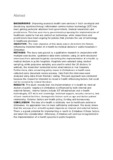Please use this identifier to cite or link to this item:
https://cris.library.msu.ac.zw//handle/11408/4470| Title: | Factors influencing e-health implementation by medical doctors in public hospitals in Zimbabwe | Authors: | Furusa, Samuel S. Coleman, Alfred |
Keywords: | e-health implementation medical doctors public hospitals Zimbabwe |
Issue Date: | 2018 | Publisher: | Indian Journal of Public Health Research and Development | Series/Report no.: | Indian Journal of Public Health Research and Development;Vol.20 ; No.1 | Abstract: | BACKGROUND: Improving access to health care services in both developed and developing countries through information communication technology (ICT) has been getting particular attention from government, medical researchers and practitioners. This has seen many governments proposing the implementation of healthcare systems that are centred on technology, while researchers and practitioners have been arguing for policies that promote the use of technology in healthcare provision OBJECTIVE: The main objective of this study was to determine the factors influencing implementation of e-health by medical doctors in public hospitals in Zimbabwe METHODS: The study was guided by a qualitative research in conjunction with multiple-case studies. Qualitative data were collected using 20 semi-structured interviews from selected hospitals concerning the implementation of e-health by medical doctors in public hospitals. Hospitals were selected using random sampling, while purposive sampling was used to select the 20 doctors. In addition, the researcher conducted direct observations at five hospitals. Furthermore, data concerning policy issues in Zimbabwe's e-health were collected using document review process. Data from the interviews were analysed using data-driven thematic coding. This solo approach was conducted because the researcher intended to reveal e-health influencing factors that could not be revealed by related literature RESULTS: This study reveals that the implementation of e-health by medical doctors in public hospitals in Zimbabwe is influenced by both internal and external factors. Internal factors include ICT infrastructure and e-health technologies, ICT skills and knowledge, technical support, security concerns, lack of basic medical facilities, demographic factors such as age and doctor-patient relationship. External factors are health policy, funding and bureaucracy CONCLUSION: The idea of e-health is relatively new to healthcare centres in Zimbabwe. Its application has not been sufficiently addressed. The study shows that the success of an e-health system depends on internal and external factors. There is a great potential for implementing e-health in Zimbabwe if these factors are taken into consideration. Otherwise, Zimbabwe will continue to lag behind in the implementation of e-health systems in public hospitals | URI: | http://www.scielo.org.za/scielo.php?script=sci_arttext&pid=S1560-683X2018000100010 http://hdl.handle.net/11408/4470 |
ISSN: | 1560-683X |
| Appears in Collections: | Research Papers |
Files in This Item:
| File | Description | Size | Format | |
|---|---|---|---|---|
| furusa.pdf | Abstract | 116.8 kB | Adobe PDF |  View/Open |
Page view(s)
140
checked on Feb 26, 2025
Download(s)
38
checked on Feb 26, 2025
Google ScholarTM
Check
Items in MSUIR are protected by copyright, with all rights reserved, unless otherwise indicated.


